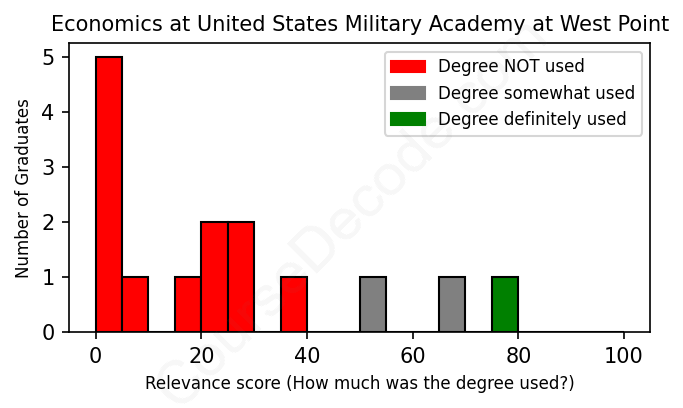
First, some facts. Of the Economics graduates from United States Military Academy at West Point we've analyzed , here's how many have used (or NOT used) their degree in their career:

These are estimates based on AI analysis of 15 LinkedIn profiles (see below).
The verdict? Horrible! Overall, with an average relevance score of 23%, Economics graduates from United States Military Academy at West Point have an exceptionally lower likelihood (-44%) of finding work in this field compared to the average graduate across all fields:
And for comparison, here's the chart for all profiles we've looked at across all degrees.
Also, after graduating, 60% of these graduates have pursued further education other than another Bachelor's degree (such as a Masters degree or other), compared to the average across all profiles of 35%. This suggests you may need more than just a Bachelors degree to be competitive as a Economics graduate.
See the details:
|
Relevance score: 76% We think this person has gone into a career highly relevant to their degree. We think this person has gone into a career highly relevant to their degree.
DEGREE INFOGraduated in 2014 from United States Military Academy at West Point with a Bachelor of Science - BS in Economics. Also pursued further education since (see below). JOB HISTORY SINCE GRADUATIONField Artillery Officer US Army May 2014 - Mar 2019 Veterans Associate Program at Bank of America Merrill Lynch  Bank of America Merrill Lynch Mar 2019 - Jun 2019 Municipal Markets Sales  Bank of America Merrill Lynch Jul 2019 - Present FURTHER DEGREES DONE SINCE GRADUATINGDiploma for GraduatesThe London School of Economics and Political Science (LSE) 2017 - 2020 ABOUTNo information provided. |
The top 10 most common jobs done by the graduates we've analyzed (ranked most common to least) are:
Here is a visual representation of the most common words in job titles for Economics graduates (this is across all Economics graduates we've analyzed, not just those who went to United States Military Academy at West Point):

Graduates of the Economics program at the United States Military Academy at West Point often start their careers in military roles shortly after graduating. Many of them take on various officer positions in the Army, serving in capacities like infantry officers, pilots, and logistics officers. This military experience is typically intensive and can last for several years, often leading to roles that involve significant leadership and operational responsibilities. After around five years, some of these graduates transition into civilian careers, often in finance, consulting, or management positions. For example, we see individuals moving into roles such as financial advisors, program managers, and account managers, showcasing a blend of their military leadership skills with economic expertise.
By the time these graduates hit the ten-year mark, there's a clear indication that many are still in leadership roles, whether within the military or in the civilian sector. Some have climbed into high-level positions, such as company commanders or senior account managers, while others have taken on roles in corporate environments, focusing on operations, sales, and other managerial duties related to their economics background. Overall, it’s evident that the trajectory tends to lean positively: many graduates are not just securing jobs, but also steering towards rewarding careers that leverage their economics education effectively. So, it's fair to say they generally find success along their paths, either within the military or transitioning into civilian roles that align with their skills and training in economics.
A Bachelor’s degree in Economics at West Point definitely comes with its challenges, and it’s generally on the tougher side compared to average programs. Not only do you have to tackle complex subjects like micro and macroeconomics, statistics, and quantitative methods, but you're also balancing military training and leadership development, which adds an extra layer of rigor. The academic standards are high, and you'll find yourself surrounded by ambitious peers, so the competition can be intense. Overall, it’s a demanding program that will push you, but if you’re passionate about economics and ready to take on the workload, it's definitely doable. Plus, the unique environment of West Point adds a level of discipline and structure that can help you thrive.
Most commonly, in the LinkedIn profiles we've looked at, it takes people 4 years to finish a Bachelor degree in Economics.
So, looking at the career paths of these Economics grads from West Point, it seems like most of them have landed pretty decent gigs, especially considering they started out in the military, which often provides solid pay and benefits. While the early years might have had lower salaries typical of military ranks, many transitioned into roles in the private sector, like financial advising and management positions, which typically pay way better. You’ve got folks working as Financial Advisors, Account Managers, and even at places like Bank of America—definitely some high-earning potential there. Overall, I'd say they’re likely making good money now, and those military backgrounds can really give you a leg up in the job market, especially in leadership roles.
Here is a visual representation of the most common words seen in the "about" section of LinkedIn profiles who have a Bachelor degree in Economics (this is across all Economics graduates we've analyzed, not just those who went to United States Military Academy at West Point). This may or may not be useful:

Here are all colleges offering a Bachelor degree in Economics (ordered by the average relevance score of their Economics graduates, best to worst) where we have analyzed at least 10 of their graduates: